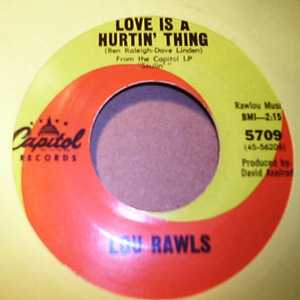
 Lou Rawls was far too smooth to be considered a great soul singer by some people. Some artists just make it look easy, and maybe that’s why Rawls isn’t usually in the discussion when it turns to the giants of the genre. For me, the subtle grit that he brought to the game gave his work that much more impact. For better or worse he was an undeniably powerful influence on the young men who followed him down the “quiet storm” road.
Lou Rawls was far too smooth to be considered a great soul singer by some people. Some artists just make it look easy, and maybe that’s why Rawls isn’t usually in the discussion when it turns to the giants of the genre. For me, the subtle grit that he brought to the game gave his work that much more impact. For better or worse he was an undeniably powerful influence on the young men who followed him down the “quiet storm” road.
Many people know Rawls from his hit records, but not as many know how he got his start. He was born in Chicago and raised on that city’s south side. As a kid he idolized singers like Billy Eckstine, Joe Williams, and Arthur Prysock, who he would see at the Regal Theater. His schoolmate was Sam Cooke, and they got their start in gospel music together, singing for a group called the Teenage Kings of Harmony.
Rawls performed with several other gospel groups, including the Pilgrim Travelers, before enlisting in the Army in 1956. When his enlistment was up, he returned to the Travelers and went on tour with Cooke. It was on that tour that a car that Rawls and Cooke were riding in crashed into a truck, killing a passenger in the car, and leaving Rawls in a coma for more than five days. Cooke escaped with minor injuries.
It took Rawls a year to recuperate, and when he did he switched to secular music. He lived in LA and worked at any venue that would give him a gig. In 1962 producer Nik Venet discovered Rawls, and signed him to Capitol Records. His debut album, Stormy Monday, was issued that year. He was backed on the collection of jazz tunes by the Les McCann Trio.
It was also in 1962 that Rawls was heard on a huge hit record, but it wasn’t his. That’s Rawls singing the passionate background vocal part on Sam Cooke’s massive hit “Bring It On Home To Me.”
Rawls continued to release albums for Capitol in a variety of styles. Meanwhile, he began to add monologues to the songs in his live act. In what could only be called a precursor to rap, Rawls would use the monologues to discuss the social issues of the day. A great example of his work during that era can be heard on the Live! album that was released in 1966.
Later in ’66 Rawls went all-in on soul music. He released the album Soulin’, which spawned his first major hit single, “Love Is a Hurtin’ Thing”. The soulful ballad made Rawls a household name, reaching #13 on the Billboard Hot 100, and #1 on the Billboard Hot R&B Singles chart. The following year “Dead End Street” went to #3 on the R&B chart and won Rawls his first Grammy for Best R&B Vocal Performance.
In 1971, Rawls left Capitol and signed with MGM. There he had a hit with the subtle black pride anthem “Natural Man.” But MGM wanted Rawls to record more lightweight pop material, and he left the label two years later. It took him three years to sign with another label, Bell Records, a noted indie. He didn’t stay long however. He moved on and found a new home at Gamble & Huff’s legendary Philadelphia International Records.
His first album for PIR, All Things In Time, was released in 1976. The album contained another huge hit for Rawls, “You’ll Never Find Another Love Like Mine.” It was the biggest hit Rawls ever had, reaching #2 on the pop chart. The follow up, “Groovy People,” was also a big one.
The late ’70s were prime time for Rawls. He hit again with the album Unmistakably Lou in 1977, and won his third Grammy. Hit singles like “See You When I Git There,” “Lady Love,” and “Let Me Be Good To You” followed.
By the time the ’80s rolled around, Rawls was part of the fabric of the music world, an established artist. He recorded for Epic Records for four years, but sales were disappointing. In 1987 he reunited with Gamble & Huff and recorded “I Wish You Belonged To Me,” which turned out to be his final chart hit. At the end of the decade his recordings for Blue Note included the Grammy-nominated album At Last.
Rawls had dabbled with acting in the ’60s, and returned to it in the ’90s. He also did some voice over work in cartoons. Most of the music he released during the decade was holiday-themed. He returned to his gospel roots with a couple of albums in the early part of the millennium.
Lou Rawls died in 2006, after a two-year battle with cancer. His reputation as a great American entertainer was secure, and his career as a great soul singer deserving of reappraisal.
[youtube id=”Dl5usKhGz60″ width=”600″ height=”350″]




Comments